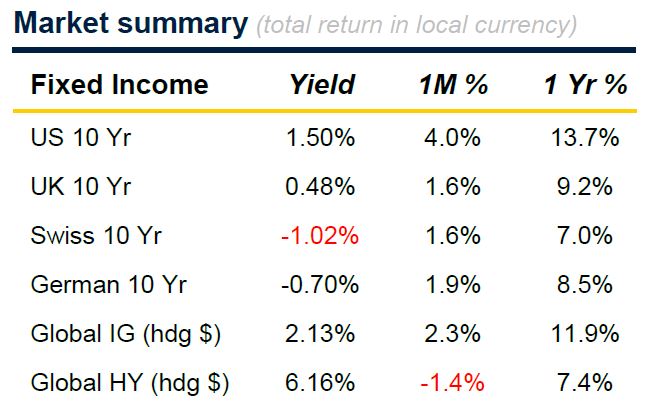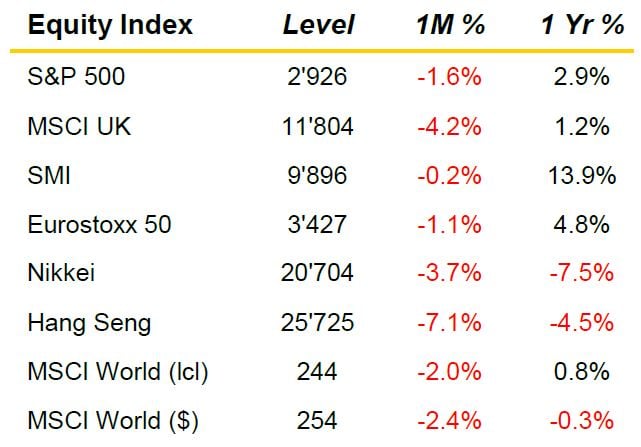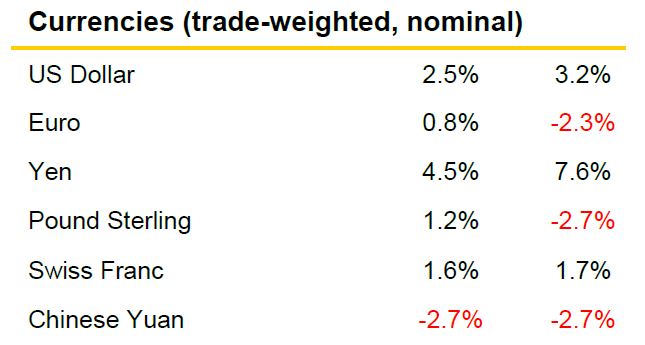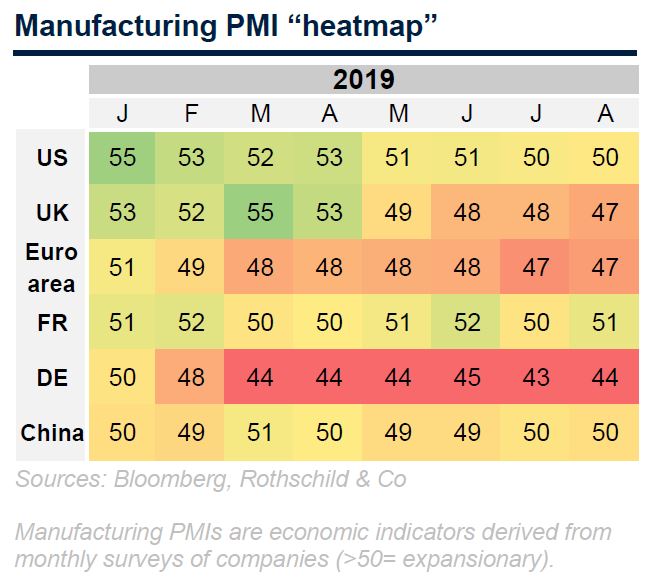Wealth Management – Monthly Market Summary

William Haggard and William Therlin, Wealth Management
Trade tensions, falling yields and political volatility
After a volatile month, global equities ended August down 2% (in local currency), while sovereign bonds prices rallied as yields fell globally to new lows. Key events included:
- An escalation in US-Chinese trade tariffs as Trump turned up the pressure;
- An inversion in the US yield curve as 10 Yr. yields fall below 2 Yr. yields;
- Escalating violence in Hong Kong, new government in Italy, Brexit tension.
A volatile month that included two one-day declines of 3% in USD stocks finished on an uptick. Volatility ebbed and flowed on fears of the impact of a worsening global trade dispute and slowing economic data in Europe and Asia. The 10yr-2yr segment of the US yield curve inverted for the first time since 2007, while the highest-quality corporate bonds saw their best monthly price gains in almost 40 years. Gold meanwhile traded at a 6-year high (+7.5% in August), and USD strengthened. Despite the Jackson Hole symposium yielding few signals, markets continue to factor in three further interest rates cuts by the Fed this year.
US: Tariffs increase, economic data cools, US yield curve
August saw an escalation in the US-China trade war with the US President announcing 10% trade tariffs on $300bn of Chinese imports starting from September. Implementation of roughly half of these tariffs, on consumer goods such as laptops and mobile phones, has now been delayed until December. The move nevertheless triggered retaliation from China, which applied tariffs of 5-10% on $75bn of US exports, and subsequent tit-for-tat from the US, which increased tariffs on all outstanding $550bn worth of Chinese imports. Meanwhile, the US economy showed signs of slowing as business investment made a weaker-than-anticipated start in Q3 and July PMIs showed the weakest pace of expansion in both manufacturing and non-manufacturing sectors for three years.
Europe: ECB to resume QE, Germany falters, no-deal Brexit
Germany's central bank warned the country may tip into recession in Q3 2019 as global trade tensions weighed on Germany's manufacturing sector. A sharp drop in July retail sales, -2.2% reinforced this forecast. The ECB meanwhile remains “ready and prepared” to resume asset purchases and decrease interest rates in September, indications which fuelled a rally in Eurozone government bonds and pushed yields to historic lows. Chances of a no-deal Brexit for the UK increased as the incoming PM, Boris Johnson suspended Parliament for five weeks from 10th September, pushing GBP lower. Meanwhile, Italy's government collapsed and reformed as a coalition of Five Star and Centre-Left parties.
Asia: Renminbi falls, trade tariffs bite, Hong Kong protests
Trade tensions saw China's renminbi suffer its biggest monthly fall in almost 25 years vs. USD, as President Trump labelled it a currency manipulator. Hong Kong saw its worst month of violence since anti-Chinese protests began in June with China mobilising its military on the border but falling short of entering the territory. The Caixin survey showed China's economy enjoyed a small rebound in manufacturing in August, after weaker-than-forecast PMIs in July. At month-end Beijing signalled it will re-open trade talks with US, lifting market sentiment.
Sources: Bloomberg, Rothschild & Co
Click the image to enlarge
Click here to continue: Monthly Market Summary - Important Information
In this Monthly Market Summary:
-
Summary (current page)
-
Important information
Download the full Monthly Market Summary in PDF format (PDF 264 KB)
Download the full Lettre Mensuelle in PDF format (PDF 414 KB)




